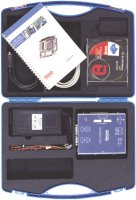Cellular modem/routers run Linux/Java/OSGi stack
Jun 21, 2007 — by LinuxDevices Staff — from the LinuxDevices Archive — 16 views Board- and system-maker Arcom has launched a family of Linux-based cellular modem/routers aimed at telemetry, Internet access, and mobile computing applications. The ZyWAN routers support GPRS, EvDO, iDEN, or CDMA, and are customizable via an SDK (software development kit) preconfigured with Linux, J2ME, and OSGi… software.
Board- and system-maker Arcom has launched a family of Linux-based cellular modem/routers aimed at telemetry, Internet access, and mobile computing applications. The ZyWAN routers support GPRS, EvDO, iDEN, or CDMA, and are customizable via an SDK (software development kit) preconfigured with Linux, J2ME, and OSGi… software.
(Click for larger view of Arcom ZyWAN)
Out of the box, the ZyWAN devices are intended to provide cellular network access to devices with serial or Ethernet interfaces. Typical examples include building systems or factory control systems.

Arcom ZyWAN I/O
The ZyWAN comes standard with Linux routing software said to enable firewalling, DHCP, DNS and NAT. A Web interface offers configuration and management, along with remote reboots and even firmware updates. Another touted feature is a GPS receiver, for tracking applications, or obtaining NMEA data strings for mapping applications, Arcom said.
 ZyWAN-SDK (Click to enlarge) |
The ZyWAN routers run a “completely open” software environment, Arcom said, enabling OEMs (original equipment manufacturers) and ASPs (application service providers) to built value-added products on top of the platform. A “ZyWAN-SDK” (pictured at right) is offered for this purpose; it includes Linux 2.6, JME (Java Micro Edition), and OSGi software pre-installed on an Arcom Zeus single-board computer (SBC).
Like the ZyWAN modem/routers themselves, the ZyWAN-SDK is based on the Arcom Zeus, an EPIC-format SBC powered by an Intel XScale PXA270 processor clocked at 520MHz. The Zeus SBC supports up to 256MB of SDRAM, and up to 64MB of flash.
Kurt Hochanandel, product manager, stated, “Unlike competitors this is a complete open-source software platform, and the board itself offers unmatched capabilities.”
Availability
The ZyWAN router appears to be shipping now in GSM/GPRS, EvDO, and iDEN models, with CDMA support pending. The ZyWAN-SDK appears to be available now.
This article was originally published on LinuxDevices.com and has been donated to the open source community by QuinStreet Inc. Please visit LinuxToday.com for up-to-date news and articles about Linux and open source.